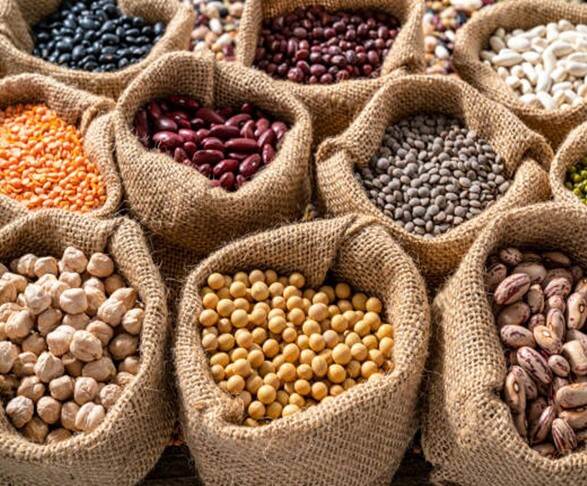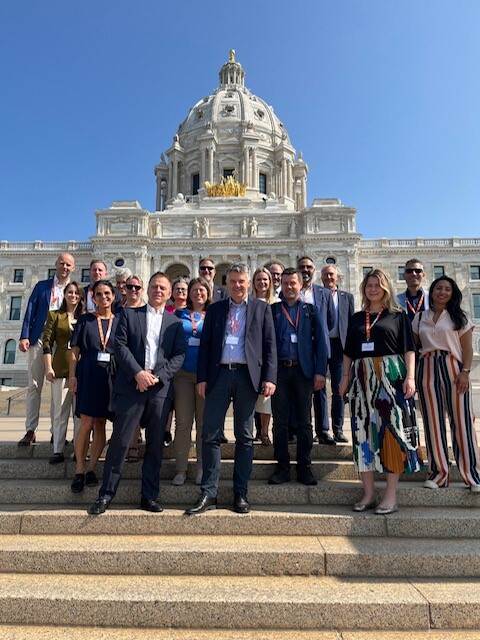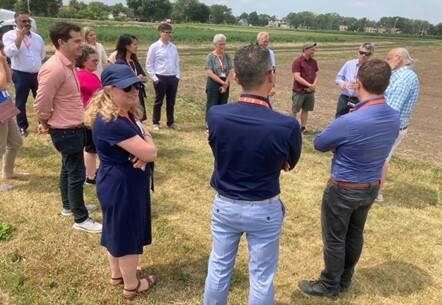Strengthening the global protein transition: the Netherlands launches innovation mission to Canada and the United States
The global focus on sustainable and balanced protein consumption has brought Canada, the United States, and the Netherlands to the forefront of a vital transition. These countries play a crucial role in the protein transition, with the Netherlands currently holding a 40/60 plant-to-animal protein consumption ratio and aiming to achieve an equal 50/50 balance in the coming years. Achieving this goal necessitates collaborations and partnerships among different parties and sectors, including start-ups, corporates, and international cooperation with Canada and the United States.

The Dutch Delegation
To foster and strengthen these partnerships, the Netherlands Ministry of Agriculture, Nature and Food Quality (LNV) initiated and organized, with immense help from the Netherlands Enterprise Agency (RVO), the Consulate General of the Netherlands in Chicago, Illinois and Vancouver, British Columbia, Oost NL, and InnovationQuarter, an innovation mission to Canada and the United States from June 19-23, 2023. The delegation was comprised of the following companies and organizations: Cefetra Group BV, Fascinating, Food XLerator BV, Rabobank, Ruitenberg Ingredients BV, Schouten Europe BV, Topsector Agri & Food, and Wageningen University & Research (WUR). Unlike traditional trade missions, the mission sought out to explore the alternative proteins ecosystem in both Calgary, Alberta and Minneapolis, Minnesota as well as explore trends and collaboration opportunities in research and development.

The Canadian Prairies
During the visit to Calgary, the Dutch delegation discovered Calgary's strategic focus on plant-based foods and witnessed the concerted efforts of Protein Industries Canada (PIC) to establish Canada as a global leader in plant-based protein production. Visits to innovative companies like Lovingly Made Ingredients and Botaneco Inc. provided valuable insights into sustainable ingredient manufacturing and cutting-edge plant-based protein development. The delegation had the opportunity to learn about the city of Lethbridge’s significant contributions to the agriculture sector and PIP International’s highest functioning pea protein isolate, observe Stamp Seeds' unwavering commitment to high-quality seed production, and admire Olds College of Agriculture & Technology’s thorough understanding of applied research and integrated learning. The culmination of visits came with a seminar on Monday afternoon (June 19) focused on international innovation in the alternative protein sector, where Dutch and Canadian stakeholders came together to exchange perspectives and explore avenues for collaboration.
As a result of their visit to Calgary and the surrounding areas, the Dutch delegation gained valuable insights into the provincial and regional strategic focus on plant-based alternatives, as well as innovative practices in sustainable ingredient manufacturing and plant-based protein production. These findings have set the stage for potential collaborations between Dutch and Canadian stakeholders in the alternative protein sector, promoting the exchange of knowledge and sparking opportunities for joint advancements in this dynamic and continuously evolving industry.
The American Midwest
During the kick-off meeting at the Minnesota Department of Agriculture, the pivotal role of agriculture in the state's economy took center stage. With nearly 400,000 jobs dependent on this sector, it served as the cornerstone of economic stability. Minneapolis has emerged as a thriving hub for the food ingredient and processing industry, with renowned companies like Cargill, General Mills, Hormel Foods, and Land O’Lakes actively contributing to the development and supply of plant-based protein products to meet the growing demand for alternatives. The meeting highlighted two pioneering research institutes driving innovations in plant-based proteins: the Plant Protein Innovation Center (PPIC) and the Forever Green Initiative. PPIC is focused on improving taste, nutrition, and functionality of alternative protein products through collaboration with 37 members from various value chain aspects. International cooperation plays a significant role, as demonstrated by partnerships with the Canadian Consulate General and the Netherlands' Wageningen University and Research (WUR), contributing expertise in developing novel plant-based ingredients. The Forever Green Initiative at the University of Minnesota stood out as a forward-thinking project, developing crops with positive conservation outcomes to benefit farmers and the environment. These specially cultivated crops play a vital role in soil protection, promoting health, and providing extra revenue streams for farmers.

Following the meeting with the Minnesota Department of Agriculture, the delegation had the privilege to meet with companies such as Bühler and Puris (plant-based protein producer) as well as to visit a local co-op grocery story called The Wedge. During their visit to Bühler Minneapolis, the company showcased sustainable food solutions and their vision to cut energy, waste, and water usage by 50% in their customers' value chain, and achieve a 60% reduction in greenhouse gas emissions by 2030.
In similar fashion to that of the program in Calgary, the Netherlands Ministry of Agriculture, Nature and Food Quality (LNV), in collaboration with InnovationQuarter and Rotterdam Partners, organized an afternoon seminar focused on Alternative Proteins. Partnering with AURI, MBOLD, and the Canadian Consulate General in Minneapolis, the seminar aimed to foster partnerships in the alternative proteins field. The initial objectives were to gain insights into the US/Minnesota alternative proteins ecosystem, to introduce the incoming Dutch delegation, and to address crucial innovation gaps and discuss possible solutions.
With nearly 50 participants, the seminar delved into the diverse innovation needs of the alternative proteins sector. The Good Food Institute also provided valuable perspectives from an international and United States standpoint. Consensus was reached on the paramount importance of taste, texture, nutrition, and price in the development of alternative proteins, with a strong emphasis on the potential for international collaboration.
This event marked a significant step in establishing partnerships between Canada, the US, and the Netherlands, facilitating future cooperation in the alternative proteins arena.

Countries Connected: The Protein Highway
Along the "Protein Highway", stretching from the fertile Canadian Prairies (Alberta, Saskatchewan, and Manitoba) through to the 11 states in the American Midwest, Minneapolis serves as a significant nexus point for collaborative work in the alternative protein sector. This strategic location facilitates a seamless flow of knowledge and innovation between Canada, with PIC playing a significant role, and the U.S. Home to various companies and research facilities, Minneapolis contributes to the advancements in novel protein sources, such as plant-based proteins and cultured meat. These innovations are the result of collective efforts transcending national boundaries and its leading research institutions, drawing on shared knowledge from the U.S and Canada, pioneer effective methods for cultivating and processing proteins, propelling growth in the sector as a whole. As a key intersection on the Protein Highway linking the Canadian Prairies and the American Midwest, Minneapolis embodies the collaborative know-how from both nations and this mutual endeavor enhances the potential for sustainable and healthy developments in the food industry, particularly within the alternative protein landscape. The agricultural and technological expertise in Minneapolis, enriched by both U.S. ingenuity and Canadian expertise, is a resource that the Netherlands can utilize and mutually benefit from.

The Road Ahead
The Netherlands' innovation mission to Canada and the United States has highlighted the immense potential for international collaboration within the alternative protein sector, leveraging each country's unique strengths and areas of expertise. This mission's success underscores the importance of ongoing dialogue, fostering relationships that can lead to meaningful partnerships and the exchange of innovative solutions. Leveraging the "Protein Highway" as a corridor for knowledge and innovation exchange, the Netherlands, Canada and the United States have the opportunity to jointly steer the global protein transition and adoption of sustainable protein alternatives, thereby contributing to a healthier planet and population.